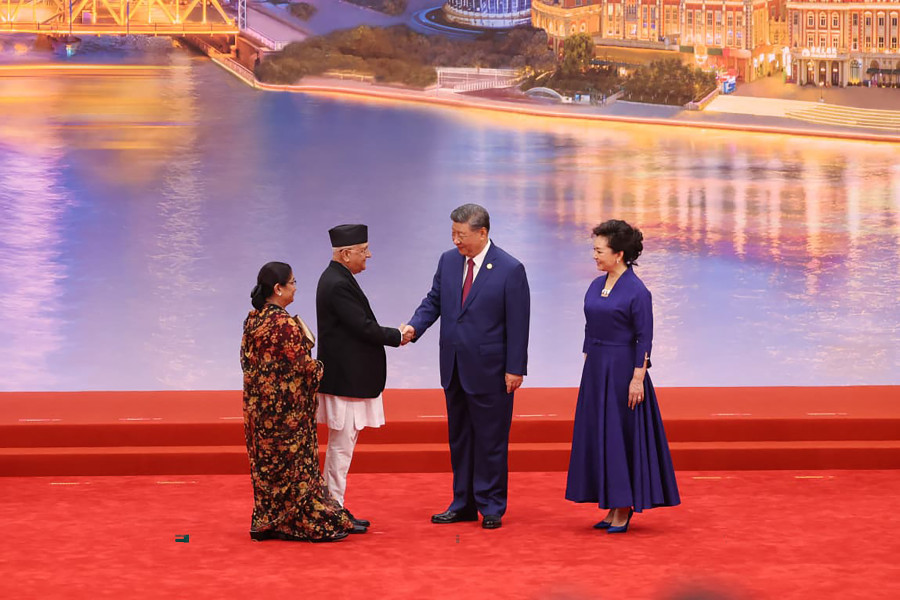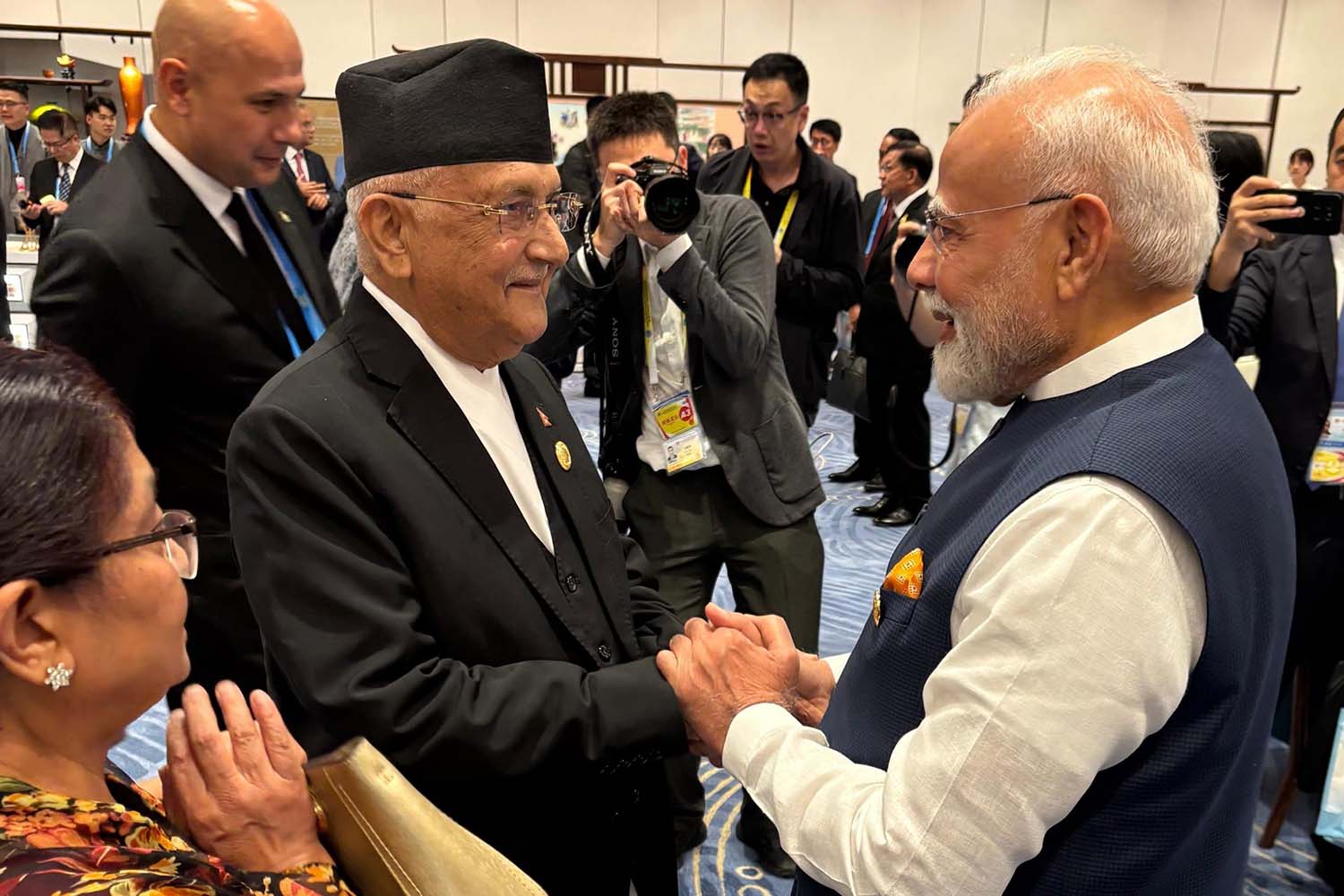National
Nepal officials reject Chinese claim on GSI
‘Why should we issue a statement when we’ve not even discussed GSI and GCI?’ says a Nepali delegate in China.
Anil Giri
The ongoing visit of Prime Minister KP Sharma Oli to China has sparked controversy over Nepal’s position over Lipulekh as well as its reported support for China-led initiatives, namely the Global Security Initiative (GSI), the Global Civilization Initiative (GCI) and the Global Development Initiative (GDI).
Currently, Prime Minister Oli is in Tianjin, China to attend the 25th Summit of the Shanghai Cooperation Organization (SCO) and an additional event, Shanghai Plus, where some heads of state and government from non-member countries are also attending. Nepal is a dialogue partner in the SCO, and is pitching to become a member.
Upon reaching Tianjin on Saturday, the prime minister held talks with Chinese President Xi Jinping, and discussed a range of issues including the recent India-China pact to resume their trade via Lipulekh.
But back-to-back statements issued by the Nepali Embassy in Beijing and the Chinese foreign ministry after the Oli-Xi meeting contradicted each other, particularly on Lipulekh and Nepal’s reported support for GSI, GDI and GCI.
Nepal has supported the GDI, which aligns with the United Nations Development Programme (UNDP), but has consistently refused to join the GSI and GCI, despite continuous pressure from China.
“Time and again, we have been telling our stated policy to the Chinese leaders and officials and we categorically conveyed to them that we cannot be part of GSI due to multiple reasons,” the immediate past Nepali ambassador to China, Bishnu Pukar Shrestha, told the Post. “Our position on the GCI was not as rigid as the GSI. We rejected the GSI outright.”
The Nepali and Chinese sides issued two separate statements on Saturday night, giving room for speculation on issues like Lipulekh, which prominently figured in Nepal’s statement, and Nepal’s supposed support for the three Chinese initiatives.
A readout by the Chinese foreign ministry after the Oli-Xi meeting claimed that “Nepal supports the GDI, GSI, and GCI, values the role of the Shanghai Cooperation Organisation, actively upholds the ‘Shanghai Spirit,’ and looks forward to China playing an even bigger role in international affairs.”
However, Nepali ministers, officials and aides currently in China with Oli rejected the claims made by the Chinese foreign ministry. “No issue or agenda of this kind was raised or discussed during the [Xi-Oli] meeting,” Badri Pandey, minister for Culture, Tourism and Civil Aviation, told the Post from Beijing.

Officials were also surprised by the text of the Chinese statement that claimed Nepal supports the three Chinese initiatives.
But Nepal has also not officially rejected the Chinese claim by issuing a statement. “Why should we issue a statement when we have not even discussed the GSI and GCI?” said a member of the Nepali delegation. “We have repeatedly clarified our principled position on our involvement in such an alliance that gives security and military connotations.”
Foreign Secretary Amrit Bahadur Rai told the Post: “During the meeting, Prime Minister Oli said that ‘we support the Global Development Initiative’ only. Nothing more.”
Likewise, Yuba Raj Khatiwada, economic and development advisor to the prime minister and also a former finance minister, termed the Chinese claims as fake news. “We have not agreed on anything as such. One-sided claims have no meaning unless we agree,” he told the Post.
After the successful execution of the Belt and Road Initiative (BRI), under the leadership of Chinese President Xi, China came up with a series of initiatives that are believed to be in counter to the West and the US.
China has unilaterally launched some programs under the GCI in Pokhara including a motor boat race. China has a partnership with UNDP to execute some projects and programs across the globe including in Nepal under GDI. But time and again Nepali officials and authorities have declined to join the GSI due to Nepal’s stated policy of non-alignment.
According to Lowy Institute, an Australian think-tank, “the GSI is a challenge to a US-led security order that China sees as rooted in military alliances… GSI-linked initiatives will spread China’s understanding of security abroad, especially where this strengthens host countries’ capacity to protect Chinese investments and development projects.”
Likewise, as per the United States Institute for Peace, a US Congress-funded think tank, the GSI “embodies Xi Jinping’s vision for a new international order in which China plays a larger security role. The initiative is not only a rhetorical campaign to win international support but also an organizing framework within which Chinese security actors can deepen concrete security cooperation with other countries.”
Be it while refusing to join military exercises proposed among Bimstec member states in 2018 or while declining to be a part of the US-led State Partnership Programme (SPP) in 2022, successive prime ministers, ministers, politicians and officials have refused to drag Nepal into any security, military and strategic alliance.
During the ratification of Millennium Challenge Corporation from Parliament in early 2022, it was more explicitly mentioned about Nepal's reservation over joining the security, military and strategic alliance and initiative whosoever proposes.
“The news of Nepal supporting the GSI is wrong,” Nepali ambassador to China, Krishna Prasad Oli told the Post over the phone, “that is fake news. The visit of the prime minister is going very well and we have not reached any such agreement or support,” said Oli.
It was Prime Minister Oli who first refused to allow the Nepali Army to take part in joint military exercise among the Bimstec member states in September 2018 in Pune, India.
“It baffles us why, time and again, issues like GSI, GCI, IPS and SPP do surface but fizzle out without any substantive clearance by the Nepali state,” a retired Nepali Army general told the Post. “Let’s imagine Oli gave assurances to the Chinese on GSI and GCI, but whose position is that?”
“Is that the position of Prime Minister Oli or his party UML, or the common position of Nepali Congress, CPN-UML and the Nepali state? Did Oli consult security agencies and his ruling partners on this topic before leaving for China? And are we ready to support the Chinese bid, as other rival security and strategic proposals emanating from the West are also knocking at our door?” the former general said.
Bishnu Rimal, chief political adviser to Prime Minister Oli, told the Post to direct such questions to the sources or persons who have been circulating news about Nepal's support to these initiatives.
“Please communicate to those who are circulating such news that we are well aware of our foreign policy.”
There is also some doubt over the government’s claim that Oli raised the issue of Lipulekh during his meeting with Xi.
Prime Minister Oli’s private secretariat released a video on Saturday night in which Foreign Secretary Rai gave details on the one-on-one between Oli and Xi. Rai said Oli objected to the recent India-China understanding on the Lipulekh pass.
During the 24th round of the India-China Special Representatives’ dialogue on boundary in New Delhi on August 20, India’s National Security Adviser Ajit Doval and China’s Foreign Minister Wang Yi agreed to reopen three traditional border trading routes, including the one that runs via the Lipulekh pass.
“In the meeting with the Chinese president, Oli raised the issue of the recent understanding between Nepal’s two neighbours and urged Xi to recognise Lipulekh as part of the Nepali territory,” said Rai. But the Chinese foreign ministry statement has not mentioned a single word about the Lipulekh dispute.
Nepali officials attributed this to differences in priorities between the two sides. “That is their [China’s] choice,” said ambassador Oli.
According to the Sugauli Treaty of 1816, all territories east of the Mahakali river belong to the sovereign nation of Nepal, Rai said quoting Oli.
“They are sovereign territories of Nepal,” said Rai while quoting Oli, “and there should be no agreement between India and China to use Lipulekh.”
“We have serious reservations over that agreement, and the prime minister put forth our position clearly,” said Rai.
In response, Chinese President Xi reportedly told Oli that China has no objection to Nepal’s claim over the territory and urged Nepal to resolve the issue bilaterally with India, according to Rai. “That point [Lipulekh] has traditionally been used as a border point but we do not want to be a party to this dispute,” Xi told Oli. “We do not object to Nepal’s claim…but the issue should be resolved bilaterally.”
Another member of the Nepali delegation to China said: “India-China relations are on an upward trajectory. And since Xi was meeting with Modi on Sunday, how could Xi irk his Indian guest by agreeing to Nepal’s claim over Lipulkeh a day before?”
When there is a disagreement on fundamental issues between two sides even after a high-level visit and meetings, it is a diplomatic practice for the two sides to issue separate statements with their respective positions, the Nepali official added.




 13.12°C Kathmandu
13.12°C Kathmandu














